
 Lincoln
Lincoln
A MAN FOR THE AGES
The execution of the assassins was the closing scene of the greatest tragedy in our history. The assassination
removed from the stage of life the greatest figure of the century.
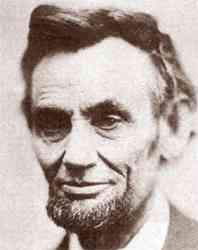 As time goes on, his place seems to grow larger; the estimate of men higher; not only did he seem to be the special
instrument raised up by Providence to save and preserve us a nation, but to strike the shackles from millions of slaves.
The mighty potency and significance of his utterances and his work in preserving us a nation and making this a land of
freedom, each year grows in the minds of men. Not only was he this mighty leader, but he had those
peculiar qualities which brought him close to the hearts of the plain people of the country.
As time goes on, his place seems to grow larger; the estimate of men higher; not only did he seem to be the special
instrument raised up by Providence to save and preserve us a nation, but to strike the shackles from millions of slaves.
The mighty potency and significance of his utterances and his work in preserving us a nation and making this a land of
freedom, each year grows in the minds of men. Not only was he this mighty leader, but he had those
peculiar qualities which brought him close to the hearts of the plain people of the country.
No pen can quite describe his personality. Each historian gives certain leading attributes to the man. I met
him only two or three times, but was brought in close touch with all the personal anecdotes and the testimony of those
who were in daily intercourse with him during his presidential office.
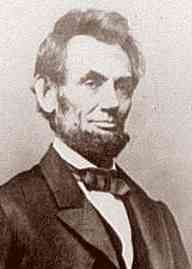 What seemed to impress those about him most, was his absolute honesty, his honesty in thought, word, and deed -- that he
was honest with every man with whom he had to deal, and honest with himself; his love of truth and his
perfect confidence in the ultimate triumph of truth, his grand simplicity of nature and speech, -- the great
brain that seemed to grow and fit itself to all new and great occasions, to be equal to any and every emergency, and
his loving, kindly nature, which seemed to draw in and hold in his heart not only his fellow countryman,
but all who lived and toiled and suffered; and he had no emnity, or hatred of any human being, not even for those
who were wicked or in the wrong, only a hatred of the wrong itself, and a great yearning that the erring
might be brought to see the right and the truth and do the things which would make for truth and righteousness.
What seemed to impress those about him most, was his absolute honesty, his honesty in thought, word, and deed -- that he
was honest with every man with whom he had to deal, and honest with himself; his love of truth and his
perfect confidence in the ultimate triumph of truth, his grand simplicity of nature and speech, -- the great
brain that seemed to grow and fit itself to all new and great occasions, to be equal to any and every emergency, and
his loving, kindly nature, which seemed to draw in and hold in his heart not only his fellow countryman,
but all who lived and toiled and suffered; and he had no emnity, or hatred of any human being, not even for those
who were wicked or in the wrong, only a hatred of the wrong itself, and a great yearning that the erring
might be brought to see the right and the truth and do the things which would make for truth and righteousness.
Of his gentleness and tenderness and kindliness of heart, an instance given by his friend Speed will best
illustrate. Lincoln and the other members of the bar from the Capitol at Springfield had been attending
Court at Christiansburg, and Speed was riding with them towards Springfield. He tells us that there was quite a party
of these lawyers riding two by two along a country lane or road. Lincoln and John J. Harding brought up the rear of the cavalcade.
We had passed, said Speed, through a thicket of wild plum and crab-apple trees and stopped to water our horses.
Harding came up alone. Where is Lincoln? we inquired. Oh, replied he, when I saw him last, he had got two young
birds which the wind had blown down from their nest, and he was hunting the nest to put them back. In a short time, Lincoln came up having
found the nest, and placed the young birds in it. The party laughted at him, but he said, "I could not have slept if I had not restored
those little birds to their mother."
You will remember also his letter to the mother who had given all her sons to her country.
"I have been shown," he says, "in the files of the War Department, a statement that you are the mother of five
sons who have died gloriously on the field of battle. I feel how weak and fruitless must be any words of mine
which should attempt to beguile you from your grief for a loss so overwhelming, but I cannot refrain from tendering to you
the consolation which may be found in the thanks of the Republic they died to save. I pray that our Heavenly Father
may assuage the anguish of your bereavement and leave you only the cherished memory of the loved and the lost,
the solemn pride that must be yours to have laid so costly a sacrifice upon the altar of freedom."
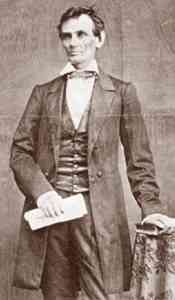 I find howhere a better statement description of the man and of his attributes,than in Choate' address upon Abraham
Lincoln before the Edinburgh Philosophical Institution in November, 1902. He says, "The growth and
development of Lincoln's mental power and moral force, of his intense and magnetic personality, after the
vast responsibilities of Government were thrown upon him at the age of fifty-two, furnish a rare and striking
illustration of the marvellous capacity and adaptability of the human intellect -- of the sound mind in the sound body.
I find howhere a better statement description of the man and of his attributes,than in Choate' address upon Abraham
Lincoln before the Edinburgh Philosophical Institution in November, 1902. He says, "The growth and
development of Lincoln's mental power and moral force, of his intense and magnetic personality, after the
vast responsibilities of Government were thrown upon him at the age of fifty-two, furnish a rare and striking
illustration of the marvellous capacity and adaptability of the human intellect -- of the sound mind in the sound body.
"He came to the discharge of the great duties of hte Presidency with absolutely no expertise in the administration
of Government, or of the vastly varied and complicated questions of foreign and domestic policy which immediately arose, and
continued to press upon him during the rest of his life; but he mastered each as it came, apparently with the facility of a trained and experienced ruler.
As Clarendon said of Cromwell, 'His parts seemed to be raised by the demands of great station.'
"His life through it all was one of intense labor, anxiety and distress without one hour of peaceful repose from first to last.
And he rose to every occasion. He led public opinion, but did not march so far in advance of it as to fail of its effective
support in every great emergency. He knew the heart and thought of the people, as no man not in constant and absolute sympathy
with them could have known it, and so, holding their confidence, he triumphed through and with them.
"Not only was there this steady growth of intellect, but the infinite delicacy of his nature and its capacity for
refinement developed also, as exhibited in the purity and perfection of his language and style of speech.
The rough backwood man, he had never seen the inside of a University, became in the end, by self-training and the
exercise of his own powers of mind, heart and soul, a master of style -- and some of his utterances will rank
with the best, the most perfectly adapted to the occasion which produced them."
And in a terse summing up of his characteristics, the words of Emerson, "His occupying the Chair of State was
 a triumph of the good sense of mankind and of the public conscience. He grew according to the need: his mind
mastered the problem of the day: and as the problem grew, so did his comprehension of it. In the war there is no place
for holiday magistrate, nor fair weather sailor. The new pilot was hurried to the helm in a tornado.
a triumph of the good sense of mankind and of the public conscience. He grew according to the need: his mind
mastered the problem of the day: and as the problem grew, so did his comprehension of it. In the war there is no place
for holiday magistrate, nor fair weather sailor. The new pilot was hurried to the helm in a tornado.
"In four years -- four years of hostile days -- his endurance, his fertility of resource, his magnamity, were sorely tried,
and never found wanting. There, by his courage, his justice, his even temper, his fertile counsel, his humanity,
he stood a heroic figure in the centre of a heroic epoch. He is the true history of the American people in his time,
the true representative of this continent -- father of his country, the pulse of twenty millions throbbing
in his heart, the thought of their mind articulated in his tongue."
And finally may it be said of him, "In his early days, he struck his roots deep down into the common soil of the earth, and in his later years,
his head towered and shone among the stars."



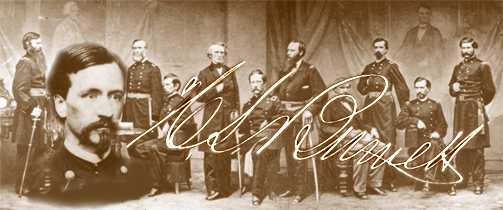
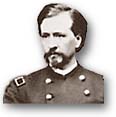








 Copyright © 1998, Mary S. Van Deusen
Copyright © 1998, Mary S. Van Deusen